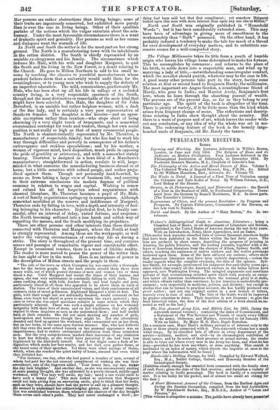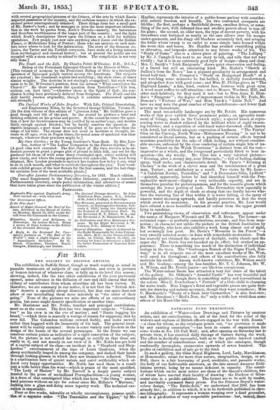PUBLICATIONS RECEIVED.
Boons.
Learning and Working. Six Lectures delivered in Willis's Booms, London, in June and July 1854. The Religion of Rome and its Influence on Modern Civilization. Four Lectures delivered in the Philosophical Institution of Edinburgh, in December 1854. By Frederick Denison Maurice, M.A., Chaplain of Lincoln's Inn.
The Philosophy of the Active and Moral Powers of Man. Volume L The Collected Virorks of Dugald Stewart, Esq., F.R.SS., &e. Edited by Sir William Hamilton, Bart., Advocate, &c. Volume VI.
Ten Weeks in Natal. A Journal of a First Tour of Visitation among the Colonists and Zulu Kalirs of Natal. By William Colenso,, D.P., Lord Bishop of the Diocese.
Corsica, in its Picturesque, Social, and Historical Aspects : the Record of a Tour in the Summer of 1852, by Ferdinand Gregorovius. Trans- lated from the German by Russell Martineau, M.A. In three parts. (The Traveller's Library.) Impressions of China, and the present Revolution : its Progress and. Prospects. By Captain Fishbourne, Commander of the Hermes, on her late visit to Nankin.
North and South. By.the Author of Mary Barton," -&o. Di two volumes.
Triibner's Bibliographical Guide to American Literature; being -a Classified List of Books,..in all.departinents of Literature and Salem*, published in the United States of America during the last forty years. With an Introduction, Notes, three Appendices, and an Index. [This useful book contains classified lists of several thousand American books that have been published in the States within the last forty years. The lists are prefaced by short essays, describing the progress of printing in America, the public libraries, and the leading journals, together with a de- fence of American literature from the charges of Alison, Sydney Smith, and others, touching the eminence of native authors and the native patronage bestowed upon them. Some of the facts adduced are curious; others show that American literature may have been unfairly depreciated,—unless the reader regards what the compiler overlooks, the date of the opinion. Syd- ney Smith, for example, pronounced his judgment five-and-thirty year's ago ; since which time nearly all the American authors in the belles lettres have appeared, save Washington Irving. The mingled arguments and assertions partake of that overstraining onesided spirit which with scarcely an excep- tion taints all American lucubrations where the national glory is at stake, and which offends rather than convinces. In law America is undoubtedly pre- eminent ; very respectable-in medicine, polities, and divinity; but except in studies that can be turned to practical account, she has hardly produced one great author; and not One original author in a new branch of letters,
i scarcely even n tone of mind. The lists of the Guide would be improved by greater attention to dates. Their insertion is not frequent: to give the book historical value, the date of the first edition of a work sheuldiacin- serted as well as the last.] The New Annual Army „List, and Militia List, for 1855, (being the sixteenth annual volume) ; containing the dates of Commissions, and a Statement of the War Services and Wounds of nearly every Officer in the Army, Ordnance, and Marines, corrected to ltit January 1855. With an Index. By Major H. G. Hart, Depot Battalion. [In a common case, Major Hart's military annual is of interest only to the Army or those closely connected with it. This sixteenth volume has a much wider range. By its classified lists of officers in every department of the service—military, medical, and civil—by its chronological exhibition of their career, and by its notes of their presence at actual service the reader is able to trace out where every man in the Army has been, and what he has done—providedlae has been anywhere, or done anything. This eeereh is faeilitated,by an index of names, which directs the inquirer at once to the page where the information will be found I
I:farther:eke' s Shilling Peerage, for 1855. ComPiled by Edward Walford, Balliol College, Oxford, and Honorary Member, of the Genealogies). Society. [Exhibits clearly enough the essential facts connected with the family story of each Peer; gives the date of the first creation ; and furnishee a variety of matter relating to lordly genealogy. The book is ,hardly of a. convenient eize. It is too bulky for the packet, and of almost too sniell,an oblong for the desk.]
A Short Historical Account of the Crimea, from the Earliest Ages and during the Russian Occupation compiled from the best Authorities. By W. Burckhardt Barker, Esq., Author of "Lakes and Penates," &c. volume is altogether a mistake. The public have alreacl,y, been Bream*
with several geographical pictures of the Crimea, of the arts by which Russia ,acquired possession of the country, and the ruthless manner in which she ex- ;praised power,unscrupulously obtained. These-things form but a small part of Mr. Barker's book ; and he manages to miss the most important-informa- tion in -the work be quotes from, Koch's Travels—namely, the barrenness and therefore worthlessness of the larger part of -the country; and the light which Koch's descriptions throw upon the Crimea as a ,field for military operations. Few people just now care anything about Jason and the Golden
pea., or Mithridates King of Pontes ; those who are anxious on such mat- ters know where to look for the information. The story of the Genoese co- lonies, the Tartar and the Turkish conquests, have more of a living interest than mythological and classical history ; but at present the public are too oceupied with a stern reality to attend to them. The compilation is not very ably done.] The Truth and the Life. By Charles Pettit APIlvaine, DD., D.C.L.;
• Bishop of the Protestant Episcopal Church in the Diocese of Ohio. [This volume of sermons by the Protestant Bishop of Ohio is a favourable apecimen of Episcopal pulpit oratory among the Americans. The subjects are practical ; the treatment is plain and searching; the style close, at times stlmoat weighty. The doctrine is not shiningly evangelical; but such would seem to be Dr. Arilvaine's position, from his sermon "What constitutes the Church ?" He there answers the question from Tertullian—" Ubi tree, ceplesia eat, licet laici,"—wherever there is the Spirit of God ; the con- clusion having been previously deaueed from Scripture. The Truth and the kile hardly reaches originality, though it exhibits unborrowed opinion and strength.]
The Poetical Works of John Dryden. With Life, Critical Dissertation, and Explanatory Notes, by the Reverend George Gilfillan. Volume II. [le the first volume of this edition.of "glorious John" Mr. Gilfillan gave a .good though curt life of the poet. In the second he prefixes a brief and striking criticism on his genius and poems. At the outset he raises the ques- tion of how far licentiousness may be justified by an author's age, and decides fairly enough againat Dryden; but he hardly resolves the question. As regards language, a poet must be acquitted if he goes no further than the usage of his time. The excuse does not avail in incident or thought, be- cause in all ages, even in Pagan times, the moral seine of mankind was clear enough, whatever their practices might be.]
My Own Garden ; or the Young Gardener's Year-Book. Bv Mrs. Lou- don, Author of "The Ladies' Companion to the Flower-Warden," &c. [A good- idea well executed. The first object of My Own Garden is to ad- monish parents to grant a proper plot of ground to little folk, and not let the gardener fob :them off with some damp overshaded spot, where nothing will grow nicely, and where the young gardeners will catch cold. The land being
• obtained, Mrs. Loudon proceeds to instruct her readers how to lay it out, what to do in each month, and what to cultivate throughout the year. Four wood- cuts exhibit groups of the best flowers for the four seasons, and the last chap- ter contains lists of the mostavailable plants.] Post-office London Parliamentary Directory, for 1855. March edition. (The usual Supplement to the Post-office Directory, contains a corrected • Parliamentary directory, ample postal information, and alterations of names that have taken place since the publication of the winter edition.] Faxtrnimrs.
.Eugland's War against England's Army.
How carried on - with what end.
• Our Government Offices. JA ,the .War Just ? ...Speech of Major. General the Earl of Lu- van, delivered. in the House of Lords, on Monday, March 19, 1855, on his Re- call from his Command in the Crimea.
Education. Secular and Religious, in 7bsonships. By Arthur Morse. Being a series of three Letters to the Editor of the Norwich Mercury.
A Reply to the Reverend Dr. Cam- - inlay's Lectures on "The End of the . World"; with a slight Glance at his
" Apocalyptic Sketches." By H. . Bland, Comedian, Theatres Royal, Glasgow, Edinburgh, and Dublin.
The Decimal Coinage Question. By John Middleton Hare junior, B.A.. Scholar of St. John's College, Cambridge.
Two Sermons, preached in Herstmonceux Church, on Septuagesima Sunday, Feb- ruary 4, 185.5.; being the Sunday after the Funeral of Archdeacon Hare. By the Reverend H. 'a. Elliott, M.A., and the Reverend J. N. Simpkinson, M.A.
An Ordination and three Missionary Ser- mons. By the Right Reverend J. W. Colenso, D.D., -Bishop of Natal. General Education. Speech delivered by the Right Honourable Sir John Peking- ton, Bart., M.P., in the House of Com- mons, on Friday, March 16, 1855, on moving for leave to introduce a Bill for the better Promotion of National Edu- cation.



























 Previous page
Previous page